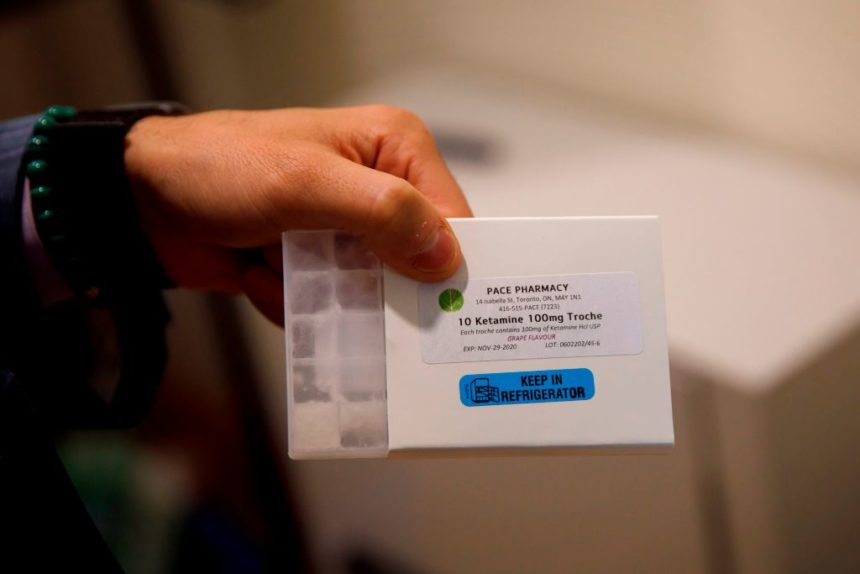Online startups with names like Mindbloom and Wondermed are fueling a mini boom in the use of at-home ketamine treatment for serious mental health conditions.
However, the prescribing trend is of growing concern to psychiatrists, who fear the safety of unassisted depression therapy with the mind-altering anesthetic.
Approved by the Food and Drug Administration in 1970 as an intravenous anesthetic, ketamine’s psychedelic qualities earned it a reputation in the ‘80s as a party drug. Known as “Special K,” it’s still the No. 1 club drug in some Asian countries.
By the 1990s, clinical trials of IV ketamine at lower doses showed the drug has antidepressant effects, leading to off-label use for treating acute suicidality, bipolar disorder and treatment-resistant depression.
More recent studies have since proven its value as a faster-acting treatment for depression and anxiety than more traditional methods. How fast? Many patients saw depression relief after just 24 hours. That’s resulted in tremendous buzz about its therapeutic potential for a range of psychiatric conditions.
In 2019, the FDA-approved a nasal form of the drug. Called esketamine, it’s sold by Johnson & Johnson under the brand name Spravato for treatment-resistant depression with suicidal thoughts. The J&J nasal spray is administered in a clinic and an appointment typically lasts two-to-three hours due to monitoring requirements.
However, at-home use of generic ketamine doesn’t require the same time-consuming supervision.
Around a dozen healthcare companies are now selling virtual access to ketamine tablets or lozenges. After signing up and paying a fee, users are screened via a telemedicine protocol. If they pass, thanks to the easing of rules for controlled-substance prescribing during the pandemic, the tablets or lozenges can be mailed to their door. The companies say they provide a range of safety information, including instructing people to take the medication with someone nearby.
But physicians recently told The Wall Street Journal that taking ketamine at home without medical supervision raises the risk of accidents, like falling and getting injured or taking the drug in higher doses than what’s prescribed. Addiction is also possible, and when the drug is administered outside of a controlled setting, patients may not get the help they need should their at-home psychedelic experience go awry.
Indeed, ketamine is a powerful drug that can have significant effects on physiological and psychological functioning. It’s not the same as, say, a daily pill for a chronic disease like high blood pressure. There’s no published evidence in support of taking it on a regular basis, other psychiatrists have warned. While it’s classified as a Schedule III non-narcotic drug, with low risk of abuse, it certainly shouldn’t be viewed as a consumer-packaged good.
Still, firms are betting that ketamine and other psychedelic drugs could replace a swath of the $238 billion annually spent on mental illness. Others in the space include FieldTrip Health, which offers “ketamine-assisted psychotherapy,” and KetaMD, a telemedicine platform for at-home ketamine treatment which was recently snapped up by Braxia Scientific for $6 million.
The companies, for their part, told the Journal that few patients have reported problems related to taking the drug. They say that prescribing ketamine at home fills a niche for those who can’t access or afford in-person ketamine infusion clinics, or who don’t respond to existing therapy.
Antidepressants are ineffective for about 15% of users, and another 40% may find them partially effective. Others can’t tolerate the side effects of commonly prescribed antidepressants like SSRIs, such as weight gain, insomnia and sexual dysfunction.
According to the Journal’s report, prices for a package including ketamine and virtual care range from $399 per month for Wondermed to $1,000 for a three-month subscription to Mindbloom. A third company, Nue Life, charges $2,999 for four months. Health insurers don’t usually pick up the tab for the off-label treatments.
During the pandemic, in addition to seeking help for mental health issues in greater numbers than before, people also started to become more open-minded to alternative treatments, like psychedelics and other non-traditional treatments.
Although it doesn’t work for every patient, and relapse has been observed, ketamine has been game-changing for some patients with treatment-resistant depression. As the mini trend of online startups shows, there is an appetite for such alternative means of treating mental health concerns.
As long as the rules around prescribing such substances online continue to be relaxed, such options may grow.







